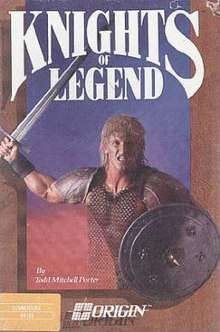Knights of Legend
Knights of Legend, released by Origin Systems in 1989, is a role-playing video game.
| Knights of Legend | |
|---|---|
 | |
| Developer(s) | Origin Systems |
| Publisher(s) | Origin Systems |
| Designer(s) | Todd Porter |
| Platform(s) | DOS, Apple II, Commodore 64 |
| Release | October 1989 |
| Genre(s) | Role-playing |
| Mode(s) | Single-player |
Story
The game is set in the fictional land of Ashtalarea, where the evil Pildar has imprisoned the Duke, the ruler of the land, and Seggallion, a knight who had stopped Pildar in the past. The player leads a band of adventurers who try to free the prisoners and stop Pildar.
Gameplay
The game is mostly tactical, with role-playing elements. The classic races of dwarves, elves and humans available for players to make up their party of adventurers. The game also adds a novel race called "Kelder" or "Kelderheit", which has the power of flight.
On the role-playing side, characters can dialogue with the inhabitants of towns, learn about local lore, purchase equipment, and pay to get trained in different skills. Quest-givers in various towns direct players to specific locations of the larger world surface, which lead to pre-made battlefields where an item is set to be retrieved to complete the mission. There are also random combat encounters when traveling outside towns.
On the tactical side, each combat round comprises planning thrusts, parries and jumps. The actions of each character (player and monster) are set prior to the combat round. The "foresight" may reveal the set actions of slower characters (who select actions for the round first). After all character choices are set, the combat round is then executed with the pre-selected actions. Additionally, combat incorporates the concept of extensive use of fatigue. Fatigue reduces a character's effectiveness and will cause them to pass out if it reaches zero. Each quest site battlefield has a tactical feel similar to later tactical role-playing games and the Jagged Alliance series: visibility is limited to what each character can actually see.
The game has a save-game feature wherein games can only be saved by resting at a somewhat expensive inn; this often makes for very long play sessions. Gaining a level is difficult, too: a character should first earn enough experience points (called "adventure points" in this game), then spend them to train weapon skills, then fight and win a duel in an arena; furthermore, when the characters gain a level, all enemies in random encounters get stronger, too.
The game had support to add region and adventure modules, which were supposed to be released starting in 1990. However, no modules were released due to Todd Mitchell Porter leaving Origin and taking the rights to Knights of Legend with him.
Reception
The game was reviewed in 1990 in Dragon #155 by Hartley, Patricia, and Kirk Lesser in "The Role of Computers" column. The reviewers normally gave a game a rating from 1 to 5 stars, but they gave the Apple II version of this game an "X" for "Not recommended".[1] The Lessers reviewed the PC/MS-DOS version of the game in Dragon #157, and gave that version of the game 5 out of 5 stars.[2] Scorpia of Computer Gaming World in 1991 and 1993 called it "tactical wargaming with a thin veneer of role-playing". She stated that the constant combat became "tedious", and only recommended it for "wargamers or devoted hack'n'slashers".[3][4]
References
- Lesser, Hartley; Lesser, Patricia; Lesser, Kirk (March 1990). "The Role of Computers". Dragon (155): 95–101.
- Lesser, Hartley; Lesser, Patricia; Lesser, Kirk (May 1990). "The Role of Computers". Dragon (157): 96–103.
- Scorpia (October 1991). "C*R*P*G*S / Computer Role-Playing Game Survey". Computer Gaming World. p. 16. Retrieved 18 November 2013.
- Scorpia (October 1993). "Scorpia's Magic Scroll Of Games". Computer Gaming World. pp. 34–50. Retrieved 25 March 2016.
External links
- Knights of Legend at MobyGames
- Knights of Legend can be played for free in the browser at the Internet Archive
- Pictures of the box and inside materials